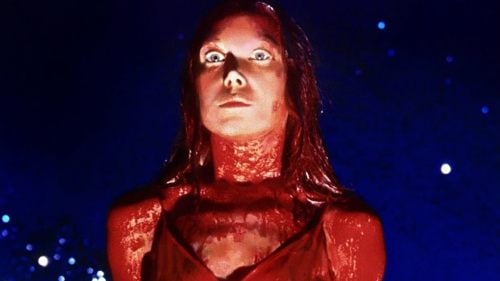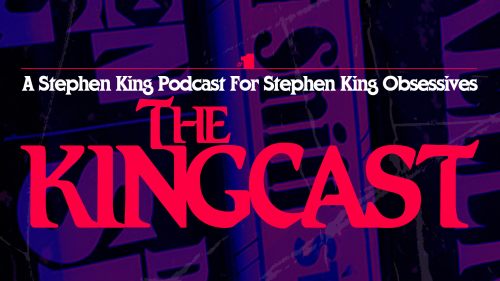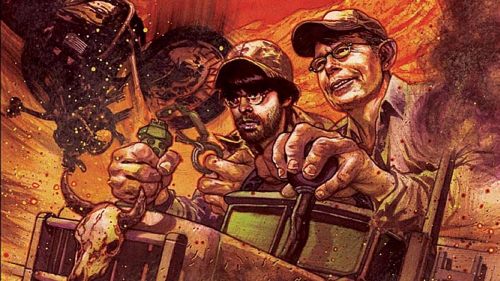IT Review: This Is Peak King
"I started after him...and the clown looked back. I saw Its eyes, and all at once I understood who It was."
"Who was it, Don?" Harold Gardner asked softly.
"It was Derry," Don Hagarty said. "It was this town."
-Excerpt from IT, Stephen King
Most of the talk surrounding Andy Muschietti’s It in the past months has been about Pennywise’s new, 19th century-inspired design and Bill Skarsgård’s interpretation of the character. But what that conversation fails to acknowledge is that Pennywise is only a symbol, a symptom of a greater evil: that of Derry, Maine, the small town with the giant homicide rate. Derry is the true monster of It, and Muschietti gets Derry very, very right.
There’s a strong sense of place in It, an awareness of geography that makes this fictional town feel actual. It also feels perfectly lifted from the pages of Stephen King’s novel, from the canal to The Barrens, from 29 Neibolt Street to Derry Public Library (and let’s not forget the standpipe). Derry's a scenic little burg, drenched in wholesome nostalgia for a more innocent time - for King, that was the idyllic 1950s, and for 2017 audiences, it’s the ‘80s, an update that makes both tonal sense and allows for a present day timeline in Part II.
But behind the charming cinema marquee heralding Batman and Nightmare on Elm Street 5, beneath the small-town roads that carry ten-speeds and Thunderbirds, Derry is sinister. It’s untrustworthy. It’s a quiet darkness that Muschietti delivers, shadowing every picturesque scene of kids splashing in the Kenduskeag Stream or biking down Center Street.
Derry's the most important aspect to nail in It, tied only with the Losers Club, and I’m happy to report that these losers are just exactly right, too. The camaraderie of these misfit kids is the heart of the story, their friendship the only effective weapon against It. You will give a shit about these kids. They’re funny - really funny! It has a ton of great jokes - and weird and defiant. Their friendship matters. It stays with you.
All of the young actors are great, but Richie, Eddie, Ben and Bev run away with our hearts. Stranger Things’ Finn Wolfhard is a riot as Richie, irrepressibly manic, garnering most of the biggest laughs with his filthy mouth and machine-gun insults. Jack Dylan Grazer earns almost as many chuckles as Eddie, this miniaturized, neurotic adult, surprisingly as foul-mouthed as Richie in spite of his fanny pack and inhaler. Jeremy Ray Taylor is a perfect young Ben Hanscom, so shy and precious he inspires cute aggression, and his dynamic with Beverly Marsh (Sophia Lillis) is one for the ages. They have a running New Kids on the Block inside joke written entirely for the film, and it establishes this budding romance on something sturdier than Ben’s hopeless crush and Beverly’s hair of winter fire. Lillis is a star, plain and simple, an astonishing presence in someone so young. Her version of Bev is something of a cool-ass rebel, a welcome update from the stammering object of desire we saw in the 1990 miniseries.
Jaeden Lieberher (from The Book of Henry and Midnight Special) is a terrific actor, but a couple script decisions rob Bill Denbrough of some of his heroism. Bill’s always been the leader of the group, and here he’s just one of the losers. In the book, he knows that his little brother Georgie’s been killed, but he’s determined to fight It on behalf of all of the other kids out there who could still be saved. Here, Georgie’s body was never found, so Bill is spurred on with a single-minded belief that he can still rescue his brother. That's a small change but one that takes something away from the character. Mike Hanlon fares worse. Chosen Jacobs gives an engaging performance, but the character’s a vacuum, lacking in any meaty scenes or motivation. Mike’s most defining characteristic – that of town historian for the losers – is oddly given to Ben, who already has plenty to define him. (And Wyatt Oleff is quite good as Stanley, but the character remains as he’s ever been, the least interesting and most cowardly of the bunch).
And what of their tormenter, Skarsgård’s Pennywise the Dancing Clown? He’s good, a cunning trap, able to pull off delightful for a beat before he transforms into horrific. He gives a completely different performance from Tim Curry’s, and that’s a good thing, because imitation is boring. I do wish Muschietti had relied more on this solid performance – and on Jackson Robert Scott’s as Georgie, adorable in life and terrifying in death - and less on CGI scares. When It incarnates as the Neibolt house leper or a twisted woman from a painting that haunts Stanley, the result is silly rather than scary, that herky-jerky effect we all remember from just about every ghost movie in the late ‘90s and early 2000s.
That brings us to the big question: is It scary? Yes, but often not in traditional ways. The jump scares are sometimes effective and sometimes fall flat, and the same is true of It’s monsters. But Derry is so damn terrifying, in ways more natural than supernatural. We’re scared of Henry Bowers and his relentless bullying, of the dreadful way Beverly’s father smells her hair, of Mrs. Kaspbrak’s malevolent over-mothering. We’re scared for the Losers because we love them so much, and we want them to be safe and happy and loved. They will not find that safety in Derry, or in their homes, but they find it in each other.
That makes for It's biggest and most important success. This is a hard-R, mainstream horror film, and it’s scary and funny and genuinely fun. It will do very well at the box office for those reasons, but we’ll all revisit it in years to come because of these kids, what they’ve been through and what they mean to each other. Losers who never feel like losers when they're together.



